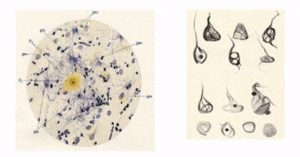Good News from the Frontlines of Alzheimer’s Research

There is growing research on the importance of early detection of cognitive deficits so that interventions may be implemented in an attempt to slow the progression of further decline. In order to provide our members the chance to be involved in cutting edge research on early memory loss, Friends Life Care has partnered with Dr. Cherian Verghese and Keystone Clinical Studies to provide the opportunity for our members to be screened for short term memory deficits.
Towards that end we are offering quarterly memory screenings at various locations in the Delaware Valley where members can receive a quick neuropsychological screening test. These screening are particularly important for individuals with Subjective Memory Complaints (SMC)- a sense of increasing forgetfulness and difficulty with remembering recent events. A high proportion of persons identified by these Memory Screenings have MCI. Like other medical tests (mammograms, colonoscopy, EKG, etc) a negative screening test is not a guarantee that there is no problem and it may be worthwhile to have an annual screening. Our second round of memory screenings are scheduled and will be beginning next week. Friends Life Care members will receive an email in the fall with details about the dates and locations for the fall screenings.
In the article below Dr. Verghese explains the exciting research that he and others are doing in an effort to combat memory loss. While progress is slow, the results of his research to date are encouraging.

Alzheimer’s Disease (AD) is a word that strikes fear in the minds of many people. And rightfully so, because of the progressive deterioration in all aspects of mental functioning that is seen in patients suffering from AD. This state of affairs is compounded by the fact that hitherto, there has been no medication that can slow down or reverse the deterioration. We are all helpless in the face of this terrible disease.
It is a little over 110 years since Dr. Alois Alzheimer described the illness and the classic “plaques and tangles” he saw in the brain of his patient on autopsy. The scientific community has learnt more about this illness in the last 10 years than in the prior 100. It is generally believed that the disease starts with the accumulation of an abnormal, toxic protein called beta amyloid or Ab 42, which spreads across the brain and causes other proteins to adopt the same abnormal configuration. These protein fibers collect and become the plaques that Alzheimer described. The Ab causes the breakdown of structures in nerve cells. One of the proteins resulting from this breakdown is called tau, which aggregates into the tangles. Tau proteins cause the progressive neurodegeneration seen in AD. The accumulation of Ab is like a snowball which causes an avalanche. Ab can collect in the brain for 10-15 years before it manifests in the first symptoms of short term memory disturbance.
Though these toxic proteins accumulate over long periods, once the memory disturbances start, the tempo of changes picks up. The earliest manifestation is short term memory problems or forgetting recent events, with no other deficits. This could be likened to just seeing blood in one’s sputum, as a harbinger of an underlying cancer, which could spread soon. This phase is called Mild Cognitive Impairment (MCI), and often goes unnoticed. MCI often manifests in the late 60s and 70s, when people are retired, are settled into a comfortable daily routine and do not do too many things that challenge short term memory- as would have happened when they were working. Left untended, this MCI stage can worsen into Alzheimer’s Dementia, where the neurodegeneration has spread to multiple brain areas, and becomes a self- sustaining problem- the avalanche rolling downhill! At this stage of Alzheimer’s Dementia, it is not expected that any medication would be useful since there is widespread brain damage. The current emphasis in the field is early diagnosis and treatment, at the MCI stage or even earlier.

The main approaches so far in the field of drug development for Disease Modifying Therapies (DMT) for AD have been to prevent the formation of Ab or to clear out the Ab that is already present in the brain. Ab is formed in the brain by the cleavage of a normal protein in the brain called Amyloid Precursor Protein (APP), by an enzyme called b-secretase. It would follow that if we were to develop a medication that could block this enzyme from cleaving this protein, we would be able to prevent the formation of Ab. There are many successful medications in the field of medicine that are based on blocking enzymes at critical junctures. The statins have been credited with saving millions of lives by blocking an enzyme involved in the formation of cholesterol. The majority of antibiotics and drugs for HIV that block key enzymes in bacteria and viruses.
The push to develop drugs for AD / MCI has been very disappointing, with a 99% failure rate. Merck had a drug, Verubecestat in late Phase III clinical trials, the last phase in development. Verubecestat held promise since it blocked APP and reduced the production of Ab in Phase II trials. However, the company announced in February 2018, that it was suspending the clinical trials since their interim analysis indicated that there was no hope of the medication proving to be successful.
A ray of sunshine in this gloomy picture was the announcement on July 5, 2018 by Eisai and Biogen, that their Phase II study with Elenbecestat, a BACE inhibitor, showed a significant reduction in brain Ab levels of patients in the study, along with a trend towards slowing of cognitive decline. This was the first drug in this class that showed a reduction of Ab on PET scans.
It is hoped that the large Phase III trials for this compound will be able to replicate this finding, which would hopefully lead to the approval of this Disease Modifying Therapy.
Cherian Verghese, MD, MRCPsych (UK)
Principal Investigator, Keystone Clinical Studies, LLC
2460 General Armistead Avenue, Suite 300,
Norristown, PA 19403. 610 277 8073
Disclosure: Dr. Verghese and Keystone Clinical Studies are working on the Phase III studies for Elenbecestat.
Leave a Comment

